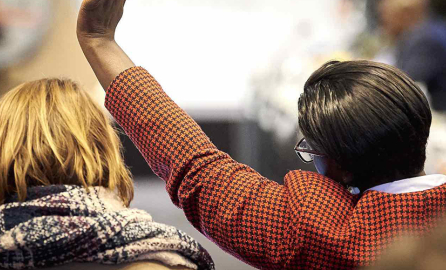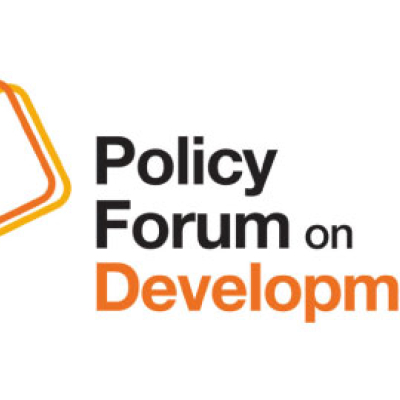In recent years, an increase in authoritarian regimes and the introduction of restrictive laws have resulted in a shrinking space for civil society in over a hundred countries. Engaging civil society actors at the international level and including their say in development policies can counter these worrying trends.
The Global Meeting of the Policy Forum on Development (PFD), held earlier this year, provided a space for civil society to discuss common challenges, while engaging in a dialogue with EU Institutions, local authorities, and associations of the private sector on how these can best be addressed through collaboration.
Government restrictions on civil society organisations are just one part of the trend, said Achieng Akena, Executive Director of the Pan African Citizens Network, an independent network dedicated to the promotion of citizen engagement with the African Union.
Crackdowns on human rights defenders and an increase in the rates of both forced disappearances and extrajudicial killings of political activists form the rest of the story. “It’s amazing that we're seeing this over 50 years after most African states achieved their independence,” said Achieng.
“Many African governments don’t fund their own civil society organisations, and yet they complain that these organisations are agents of the West because they get their funding externally,” said Achieng – with this often serving as a justification for imposing restrictive measures.
|
Achieng Akena on the challenges faced by civil society in Africa: |
According to Achieng, as governments accept funding from outside, they should expect that civil society will, too.
“There is a perception that because the EU provides money, they direct what happens. This has not been our experience in the space of the PFD” she said. Achieng is part of the PFD Task Team, responsible for setting the PFD’s agenda and determining the issues discussed – in turn structuring the dialogue with the EU.
“But speaking more generally about this relationship, I think it is one that needs to be continuously interrogated,” she said. “Being a funder, vis-avis being a partner, is a relationship the European Union constantly struggles to negotiate. We, too, as partners and actors from countries that receive aid from the EU, are constantly negotiating this relationship, trying to see how to ensure it doesn’t become unequal.”
Despite the decrease in funding for civil society globally, Achieng is optimistic. “The one thing that civil societies in Africa have perfected is the art of resilience,” she said, adding that through their work on the ground civil society actors continue to play a central role in the international dialogue, contributing to discussions on development policy.
Cooperatives in development
“Civil societies in Africa have perfected the art of resilience”
Africa’s young civil society movements are not the only ones facing difficulties. Cooperatives across Asia and the Pacific are increasingly finding themselves faced with problems, too – though for different reasons.
With a history dating back more than a century, these cooperatives have enjoyed high degrees of support from governments, due to the public good they provide. With economic shifts resulting in the erosion of traditional industries in many countries, however, this is changing.
“Governments are not as supportive as they have been in the past and new regulations and tax regimes are being imposed on cooperatives,” said Savitri Singh, Programme Director at the International Co-operative Alliance (ICA) Regional Office for Asia and the Pacific.
For Singh, the increased constraints on cooperatives’ ability to operate effectively have been compounded by a diminished inclusion in national discussions and policy determination.
The rise of globalisation, she said, has meant that cooperatives have found themselves increasingly side-lined.
With an emphasis on industrialisation and the development of modern service industries, the private sector has been given a preferential position at their expense.
|
Savitri Singh on the history and role of cooperatives in sustainable development: |
Singh pointed to Japan as an example, where lobbying from the private sector has weakened the strength of the agricultural cooperative network. In India, cooperative banks have been faced with a similar situation – when their tax-free status was revoked, they were forced into competition with the private sector.
Given cooperatives status as non-profit businesses – and their use as a tool for empowerment of people using limited resources – placing them in competition with profit oriented companies jeopardises the social good they provide, she explained.
“Cooperatives are the only business organisations that are sustainable; [collectively,] they’re also one of the biggest employers in the world,” said Sing, adding that they should therefore be promoted as such.
Following the 2008 economic crash, the UN acknowledged cooperatives's role in a series of statements. The EU recognised cooperative as civil society organisations soon after and included them in its 2030 Agenda for Sustainable Development.
The recognition has resulted in concrete measures to counter the national erosion faced by many cooperatives. In 2016, the ICA signed a four-year partnership agreement with the EU, with the goal of strengthening the capacity of cooperatives through a focus on policy, lobbying, advocacy and research.
“Cooperatives are trying to compete and stand in the market. That shift is happening”
Cooperatives themselves are adapting too, Sing said. Through collaboration with the private sector in the form of cooperative and private partnerships (CPPs), both sides have been able to strengthen their position. “Cooperatives are trying to compete and stand in the market, with many successful examples in Japan, India, and Korea,” Sing said. “That shift is happening.”
Finding a structural solution
Civil society may face opposition in their countries of origin, but bringing a common voice to the international level is a way of finding a common future. Rigo Belpaire, Team Leader and Assistant to the Head of the Post-Cotonou Task Force at the European Commission, explained what this can look like in practice.
The current Cotonou Agreement frames the European Commission’s relationship with the African, Caribbean and Pacific (ACP) states. It expires in February 2020, so the new iteration will provide a chance to build on the strengths, Belpaire said.
|
Rigo Belpaire explains how civil society is being addressed in ACP negotiations: |
“We are trying to have a very comprehensive agreement that structures our relationship with all these countries at different levels… and we are of course trying to make it a multi-actor partnership – it’s not only about governance,” he explained.
For Belpaire, the Global PFD’s annual nature provides ground for a structured dialogue – with input from the members informing the recommendations given by the PFD Taskforce.
“There are a number of values and commitments that make this partnership very important for civil society,” he said. “We discussed their role in the partnership – and how such a legal agreement can help create a better environment for them to work in, improving their role as both advocates and service providers.”
The original Cotonou Agreement, Belpaire added, “was already very progressive by giving official recognition to civil society, local authorities, and the private sector within the partnership. We have to take the lessons learned forward – we should involve these actors in the political process in a more systematic and integrated way.”
This article was written by Craig Hill, Journalist and Content Editor at Capacity4dev.





Log in with your EU Login account to post or comment on the platform.